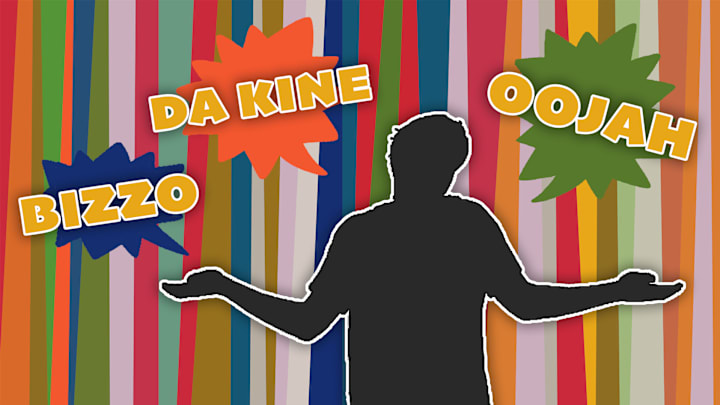Philadelphians have something special in jawn, a slang term that can mean basically whatever you want it to. Maybe you don’t know what a given thing is called, don’t want to be more specific, or simply don’t need to be more specific—because context clues already make it clear what you’re talking about. But jawn isn’t the only word of its ilk; these lexical chameleons are surprisingly common across English and its offshoots. From thingummytite to gilguy, here are eight of our favorites.
Thingummytite
If The Little Mermaid’s Ariel had mentioned all of thingamabob’s cousins in “Part of Your World,” the song would have lasted the whole movie. English speakers have riffed off the word thing in every direction, from the fairly well-known thingy and thingamajig to the British colloquialism thingummytite. It’s an extension of thingummy, which itself is an extension of thingum.
Dingus
Dingus is likely derived from Dutch and/or Afrikaans, both of which use the word dinges to describe things of some sort. People in North America and South Africa have been invoking dingus for something (or someone) they can’t or won’t name since the mid-19th century. The term didn’t come to mean “a silly or inept person; a fool” until the late 20th century—but that’s not its only other definition. It’s also slang for the penis.
Oojah

But not all these “thing” words feature the word thing in their origin stories. Oojah, which British soldiers coined during World War I, came from elsewhere—though we can’t confirm where exactly that was. One theory suggests that it may be a clipped form of some more formal phrase in the same way whatchamacallit is really what you may call it.
Another possibility is that it hails from ḥujjat, the Urdu and Persian word for “argument” (or its Arabic predecessor, ḥujja). There’s support for this theory in the existence of the oojah variant oojah capivvy, which resembles the Urdu and Indo-Persian phrase ḥujjat kāfī fīhi, meaning “the argument is sufficient” (essentially “enough said”).
During World War II, oojah gained another sense among military personnel: “sauce or custard.” There was also oojah-cum-spiff, meaning “fine” or “all right,” which mostly exists in the works of P.G. Wodehouse (and may in fact have been invented by him).
Da kine
Da kine is basically the jawn of Hawaiian Pidgin. It originated from that kind, possibly reflecting how English speakers use the phrase that kind of thing. But the scope of da kine goes far beyond its etymon: Hawaiian Pidgin speakers deploy it as a noun, adjective, adverb, and verb. It comes in handy when you’d rather not spell out exactly what you mean, which Atlas Obscura illustrates like so: “Don’t get sloppy with me, before I da kine you.” Other times, you might use it to fill in a blank for a word you can’t recall or that listeners will just find obvious based on context alone—as is the case with “I wen pick up one case da kine,” via the blog Kaʻahele Hawaiʻi. The expression’s versatility definitely doesn’t stop there.
Frammis
As early as the 1930s, people were using frammis for anything from an unnamed object to confusion or nonsense. Where they got the idea is a mystery. But it was also around this time that Frammis became a go-to fake name for any person or company, which suggests that the inspiration for the term may have been a real person with the surname Frammis. Whatever the case, Frammis got lots of play in comic strips. New Republic reported in 1944 that in the comic strip Silly Milly, “all names are Frammis, laughter is Yuk Yuk, and the language of animals is Coo.”
Tiddlypush

Tiddlypush was another fake surname of choice in the 20th century. “When an engagement has been broken off The Times doesn’t print long reports from its special correspondent,” a character says in Wodehouse’s 1939 novel Uncle Fred in the Springtime. “It simply says ‘The marriage arranged between George Tiddlypush and Amelia Stick-in-the-mud will not take place.’ ”
Or you could use it as an all-purpose replacement noun, as Samuel Beckett did in his short story “What a Misfortune.” One “Mr. bboggs” sings the following:
“He wore a belt
Whenever he felt
A pain in his tiddlypush,
A chemical vest
To cover his chest
When cannoning off the cush.”
Bizzo
In Australia and New Zealand, bizzo is a stand-in for thingy. It’s short for business, so it makes sense that people also use it to describe actual business, “either personal or commercial,” per the Oxford English Dictionary. “You leave the bizzo side to me,” a character says in Alan Duff’s 1992 novel One Night Out Stealing. (Like frammis, the term can also mean “nonsense.”)
Gilguy
Guy in nautical parlance refers to a rope used to steady something being lifted or lowered (or to secure something that wouldn’t stay put otherwise). Another name for that is gilguy, which 19th-century sailors co-opted for anything they didn’t know what to call.
Discover More Fascinating Slang:
